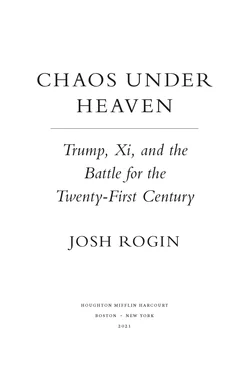A New Dawn
Starting well before November 3, 2020, journalists, think tankers, and diplomats all over Washington had devoted endless hours to speculating about what a Biden administration foreign policy might look like, especially with regard to China.
Inside the Biden campaign, there were hundreds of informal advisers assembled into dozens of policy teams before the election. These teams were meant to keep think tankers plied with busywork, filing memos to each other while they jockeyed for potential administration jobs. There were only a few campaign officials on foreign policy who really mattered. At the top of the list was former deputy secretary of state Antony Blinken.
In a series of public events during the campaign, Blinken said a Biden administration would fix what he called a failed Trump approach to China. “Right now, by every key metric, China’s strategic position is stronger and America’s strategic position is weaker,” he told the US Chamber of Commerce in September, promising that a Biden administration would fix the structural issues in the trade relationship where Trump’s trade deal failed.
One leading adviser and potential cabinet member before the election was Delaware senator Chris Coons, who told me during the campaign that a Biden administration would convene the free and open societies of the world, perhaps in a formal manner under the banner of a community of democracies, to rally allies around the common cause of confronting China’s malign behavior and pushing back on rising digital authoritarianism around the world. The Biden team would focus on “confronting China in a way that offers the opportunity for a partnership where appropriate and standing up to their human rights violations domestically and their assertiveness, even aggressiveness, regionally,” Coons said.
Inside Biden World, this competition-focused view was shared by many. But other senior officials who had resisted this view at the end of the Obama administration were still around. They included Susan Rice, who led the last meeting between the Obama administration and the Chinese leadership before the 2016 election in New York, and former national security adviser Tom Donilon, who chairs the Blackrock Investment Institute, one of the Wall Street companies most deeply invested in China.
The question of how Biden would engage with China became a lot more pressing on Saturday, November 7, when the former vice president’s lead in Pennsylvania became great enough for news networks to declare him the winner of the 2020 presidential contest. In the days that followed, as Biden set about organizing his transition and Trump did everything in his power to deny the reality of his defeat, China remained eerily silent. There was little doubt that the Chinese leadership preferred the establishment candidate to the disruptor. But at a time when other nations were hastening to congratulate President-Elect Biden, China’s careful statement finally issued on November 13, hedged by saying the Chinese government congratulated Biden but understood the result “will be ascertained in accordance with U.S. laws and procedures.” This was a sure sign the Beijing leadership was itself unsure what the next phase of the relationship would look like.
Like the Trump administration, the Biden administration would come to have different factions competing for control and influence over the China issue, and vying to push it toward competition or engagement. As of this writing, those fights are just beginning. The main indicators of which side is winning will be who gets key positions in the new administration, as well as how Biden reacts the first time Xi tries to lull him back into familiar patterns of soothing language meant to obscure serious concerns. But it will also be telling to see which policies from Biden’s predecessor are carried over into the new administration.
There will be certain elements of Trump’s China policy that the Biden team would be foolish to toss aside. The tariffs, no matter how they got there, represent real leverage that Biden would be smart to use rather than just give away in order to start negotiations afresh. The Justice Department’s efforts to enforce laws to counter Chinese espionage should continue, albeit with careful watch to make sure the sensitivities and rights of the Asian American community are protected. The drive to force transparency in foreign funding of US institutions and seek reciprocity from Beijing in its treatment of Americans should be bipartisan. The Biden campaign had criticized Trump for not standing up to Beijing’s human rights violations, but the incoming administration will find that a lot of work has already begun—and deserves to be continued.
As with the Trump administration, the Biden administration will find that conflicts of interest, too, will remain a defining feature of the US-China relationship. During the campaign, the Biden team refused to even comment on Hunter Biden’s long record of working with Chinese state-affiliated companies and shady Chinese executives. After the election, however, Biden won’t be able to use “election interference” as an excuse for dodging legitimate questions about his family’s connections to America’s most serious geostrategic competitor. In fact, before it became a taboo subject, Hunter’s dealings with several Chinese companies had already been widely reported: in a long piece in 2018 by the New York Times, in Peter Schweizer’s 2018 book Secret Empires (which was funded by a Bannon-connected organization), and in a 2019 New Yorker profile in which Hunter Biden admitted he tried to negotiate a Louisiana deal for a Chinese energy company and became the personal lawyer for a Chinese businessman who was later convicted of bribery. After one meeting in Miami, the energy company’s chairman gifted Biden with a 2.8-carat diamond Hunter says he gave to his business partner. “What would they be bribing me for?” Hunter told the New Yorker. “My dad wasn’t in office.”
Joe Biden’s younger brother James has also refused to answer basic questions about his involvement in business dealings with China. Hunter and James Biden were both partners in a company called Sinohawk Holdings, which was a joint venture with CEFC, the same Chinese energy company whose chairman, Ye Jianming, gave Hunter the diamond in Miami. Ye, who had previous ties to Chinese military intelligence, was arrested by Chinese authorities in 2018 under suspicion of corruption and hasn’t been heard from since.
Hunter Bidens defense is either disingenuous or naïve. The CCP doesn’t only bribe officials when they are in power. They invest in these relationships over time and try to compromise officials and their family members in both parties. In order to truly end this pattern of corruption, President Biden will have to answer valid questions about his brother and his son, who were clearly trading on the family name to make money in China for several years.
How Does This End?
The late senator John S. McCain would often quote Mao Zedong as saying, “It’s always darkest before it goes completely black.” There’s no evidence Mao ever said such a thing. In fact, it’s extremely unlikely Mao would have been familiar with the reference (a quote from seventeenth-century English theologian Thomas Fuller), much less adapted it for comedic effect. That’s why McCain repeated the quote so often; he thought it was funny. But spurious or not, the quote aptly captures the mood in Washington, DC, at the end of Trump’s presidency. The fact that McCain—no great admirer of the CCP or Trump—was not around to appreciate the irony makes it even more fitting.
The series of events that brought US-China relations to where they sat at the end of the Trump presidency was far from predictable, much less inevitable. No one in the United States or China could have foreseen Trump, a president who was not beholden to any form of conventional wisdom and was driven by his own instincts in a way that made a range of new policies suddenly possible, but simultaneously running a government so dysfunctional that implementing those policies was near impossible.
Читать дальше











